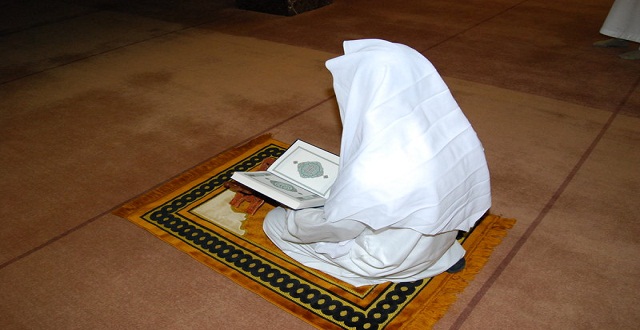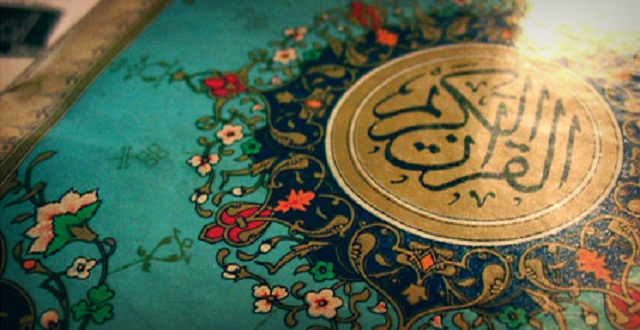
In connection with the greatness of the Noble Qur`an, we begin by quoting a few statements from some of the renowned personalities and also from those individuals, who have been accused of standing up to combat the Qur`an.
1. ‘Abu al-‘Ala Mu’arri (accused of attempting to challenge the Qur`an) says: “It is a matter of consensus amongst all the people – Muslims and non-Muslims alike – that the book that Muhammad (a.s) has brought, has subjugated the intellects and till today, no one has been able to bring forth the like of it. The style of this book does not tally with any of the styles that have been prevalent amongst the Arabs, such as oratory, ‘rajaz’3 poetry, rhymed prose of the clergy etc.
The superiority and the attraction of this book is of such high calibre that if one verse from it is placed amongst the words of others, it would shine out like a radiant star in a pitch-black night!”
2. Walid b. Mughairah al-Makhzumi – He was well known for his prudence and good management amongst the Arabs who used to benefit from his acumen and managerial skills to solve their social problems in the Pre-Islamic era. It was for this reason that he was called:
رَيْحاَنَةُ قُرَيْشٍ.
“…the crème de la crème of the Quraish.”
When he heard the first few verses of Suratul Ghafir from the Noble Prophet (s.a.w) he appeared in a gathering of the tribe of Bani Makhzum and said: “By Allah! I have heard a speech from Muhammad, which resembles neither the speech of humans nor that of the fairies.”
وَ إِنَّ لَهُ لَحَلاَوَةً وَ إِنَّ عَلَيْهِ لَطَلاَوَةً وَ إِنَّ أَعْلاَهُ لَمُثْمِرٌ وَ إِنَّ أَسْفَلَهُ لَمُغْدِقٌ وَ إِنَّهُ لَيَعْلُو وَ لاَ يُعْلَى.
“His speech possesses a special sweetness and an exceptional beauty. The top of it (like the fruitful branches of a tree) is full of fruits and the bottom of it is (like the roots of an ancient tree) firm and strong. It is a speech that shall prevail over everything and none shall prevail over it.”4
3. Thomas Carlyle, the renowned historian, in respect of the Qur`an says: “If we cast one look at this holy book, we observe that salient realities and characteristics of the secrets of existence have been so nurtured in its contents that its greatness and truthfulness becomes plainly manifest – and this is a great distinction, which is specific only to the Qur`an and not seen in any other scientific, political or financial work.
Yes, some of the books do tend to deeply affect the mind of the reader – however, this just cannot be compared to the influence and effect of the Qur`an. As such, it must be said: “The fundamental distinction of the Qur`an and its basic tenets lies in its truthfulness, pure sentiments, salient topics and the important themes – none of which provide room for any kind of scepticism and uncertainty – and in the fact that it encompasses all the virtues and excellences that bring about human perfection and happiness, and very clearly defines and illustrates them all.”5
4. John Davenport – the author of the book, An Apology for Mohammad and the Koran, writes: “So exempt, indeed, is the Koran from these undeniable defects, that it needs not the slightest castigation, and may be read, from beginning to end, without causing a blush to suffuse the cheek of modesty itself.”6
He also says: “It is universally allowed to be written with the utmost purity and elegance of language in the dialect of the tribe of the Koreish, the most Noble and polite of all the Arabs, but with some mixture, although very rarely, of other dialects. It is, confessedly, the standard of the Arabian Language, and abounds with splendid imagery and the boldest metaphors … and is generally vigorous and sublime.”7
5. Goethe, the German scholar and poet says: “The Koran is a work with whose dullness the reader is at first disgusted, afterwards attracted by its charms, and finally irresistibly ravished by its many beauties.”8
On another occasion, he writes: “For years on end priests, lacking cognizance of Allah, had held us back from comprehending the realities of the Noble Qur`an and the greatness of the person who had brought it – Muhammad (s.a.w) – yet, as we have treaded the path of knowledge and science, curtains of ignorance and baseless prejudice moved aside from before us and very soon this indescribable book (Qur`an) attracted the world towards itself – profoundly influencing the knowledge and science of the world – eventually becoming the pivot of thoughts and ideas of the people of the world!”
He also says: “Initially we had turned away from the Qur`an but it was not long before this book attracted our attention towards itself leaving us baffled and amazed in a measure that compelled us to bow our heads in submission before its lofty and scientific laws!”
6. Will Durant – the famous historian says: “The Qur`an has generated within the Muslims such self-esteem, justice and piety that the like of it has not been witnessed in any region of the world.”
7. Jules La Beaume – the French thinker and writer, in his book An Explanation of the Signs, states: “The people of the world came to acquire science and knowledge from the Muslims, who acquired them from the Qur`an, which is an ocean of knowledge, and caused streams (of knowledge) to flow from it in the world, for mankind…”
8. Another orientalist, writes: “It is mandatory for us to acknowledge that natural, astronomical, philosophical, mathematical sciences, which have seen a boom in Europe, are mainly due to the blessings of the Qur`anic teachings and as such, we are indebted to the Muslims – in fact, Europe, in this regard, is one of the cities of Islam.”
9. Doctor Laura Veccia Vaglieri – a professor in the University of Naples – in her book The Rapid Growth of Islam, writes: “The divine book of Islam is one example of a miracle. It (Qur`an) is a book, which cannot be imitated. The style and modes of the Qur`an do not have any literary precedent. The influence that this style has upon the soul of man is a result of the distinctions and excellences that it possesses. How can this miraculous book be a work of Muhammad (s.a.w), who had been an unschooled Arab?
In this book we observe treasures and reservoirs of knowledge which is beyond the ability and capacity of the most intelligent individuals, greatest philosophers and strongest political and legal personalities. And it is because of these aspects that the Qur`an just cannot be the work of an educated or a learned person.”910
One of the things which proves the authenticity of the Qur`an and its revelation by Allah is the fact that there is no contradiction or discrepancy in the entire Qur`an. To understand this reality, consider the following explanation: The mentality of man is constantly in a state of change. The Law of Development – under normal circumstances – envelopes man, his thoughts and mentality, and with the passage of time, tends to change his ideas and speech.
If we reflect carefully, we shall observe that the works of a writer are never similar and uniform; even in one book, the start and the end are seen to possess variations – especially so if a person finds himself in the midst of great and important events – events, which would establish the foundations of an all-encompassing ideological, social and doctrinal revolution. Such a person, however much he may try to maintain uniformity in his works, would never be successful – especially if he is unschooled and fostered in an environment that is totally backward and undeveloped.
However, the Qur`an, which has been revealed over a period of 23 years under various conditions, in various environments and in accordance with the corrective and educative needs of man, is a book which deals with a variety of topics. It is unlike other ordinary books that confine themselves to just one topic like politics, society, philosophy, law or history; rather, it is a book that, at times, talks about Unity and the mysteries of creation, at other times about decrees, laws, customs and etiquettes, and on occasions about the past nations and their shocking histories, and about advices, admonitions, worship and man’s relation with Allah – and as Doctor Gustav Lebon puts it: “Qur`an, the divine book of the Muslims is not restricted to religious teachings only but also contains political and social rulings for the Muslims.
A book possessing such features would normally not be free of contradictions and discrepancies. However, when we witness that despite these aspects all its verses are in complete harmony with each other and without the slightest discrepancy, contradiction or asymmetry, we can safely surmise that this book is not a product of human thoughts, rather it is a book that has been sent down by Allah, a fact which has been emphasized by the Qur`an itself.”111213
Verses 12 to 14 of Suratul Hud once again stress the miraculous nature of the Qur`an and declare that this is not an ordinary speech and also not a consequence of human thoughts; it is a divine Revelation, which finds its origin in the Infinite Knowledge and Power of Allah. For this reason it puts forth a challenge and dares the entire world to pick up the gauntlet and step forward to combat it (by bringing the like of it). In view of the fact that the contemporaries of the Noble Prophet (s.a.w) and all the communities that have existed, till today, have failed to stand up before this challenge – expressing their willingness to face every other difficulty in trying to put Islam down but shying away from endeavouring to combat the Qur`an by bringing the like of it – it is plainly evident that basically such a task was – and is – beyond the ability of man. And is miracle something other than this?
Even today, this call of the Qur`an still rings in our ears and this eternal miracle still invites the entire world towards itself, challenging all the knowledgeable and scientific circles to combat it, not only with regards to eloquence – beauty and attractiveness of speech – but also with respect to its contents – sciences which, in that period, had been hidden from man; laws and rulings that guarantee prosperity and deliverance for the human species; statements and explanations that are free from contradictions, discrepancies and prevarications; historical accounts that are free from myths, exaggeration and idle talks – and the like.14
Sayyid Qutb, in his commentary, In the Light of the Qur`an, has reported that some materialists, who had presented themselves at a convention of orientalists in Russia in 1954, in a bid to fault the Qur`an, said: “This book cannot be the outcome of the thoughts and ideas of one man – Muhammad – but it must be the result of the efforts of a large group of individuals! Moreover, it also cannot be believed that all of it had been written in the Arabian Peninsula, rather, it is certain that parts of it have been written outside it!”15
They found themselves helpless – since they, on the one hand, on the basis of their reasoning which revolved around the rejection of the existence of Allah and Revelation, always sought a material explanation for every thing, whilst on the other hand were unable to accept the Qur`an to be the product of the thoughts of an individual within the Arabian Peninsula – they had no other option except to come up with this ridiculous theory of ascribing it to a group of individuals from within and outside the Peninsula – a notion which history rejects entirely.1


















